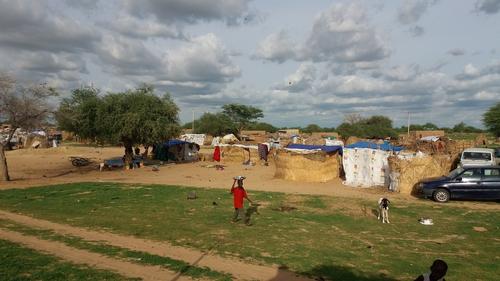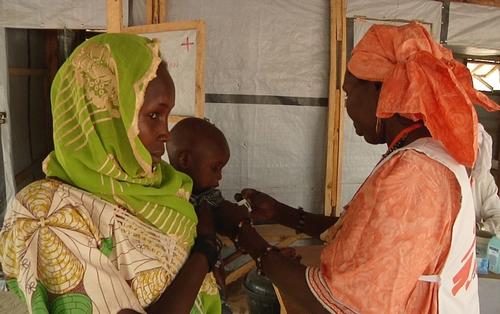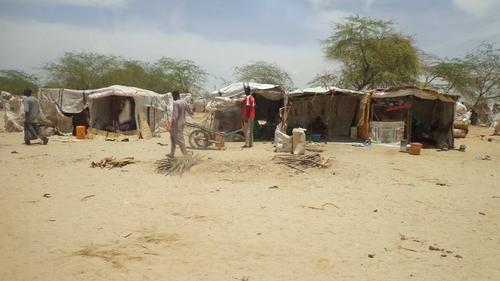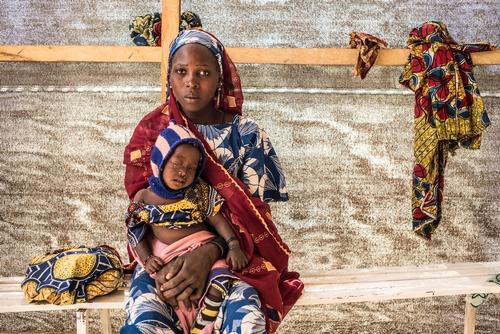Nearly 28,000 people have recently taken refuge in the Diffa region in Niger after fleeing attacks by Boko Haram. Médecins Sans Frontières (MSF) is expanding its medical activities and is taking measures to improve the health situation in the two newest settlements. Ahmad Samro, project manager for MSF, describes the situation in Diffa.
What are the living conditions like for those who have recently arrived in the Diffa region?
There has been a constant flow of people arriving in Diffa over the past three months. Today, the authorities estimate that around 11,000 people are living in Assaga, around fifteen kilometres east of Diffa. The families fled Nigeria in May, leaving everything behind while Boko Haram reduced their village to ashes. The refugees are now entirely dependent on humanitarian aid. While they have quickly built huts, and some have received plastic tarpaulins and other essential supplies, most do not have access to drinking water, and the hygiene conditions are appalling.
Around 25 kilometres west of Diffa, around 17,000 refugees have recently settled between Chetimari and Gagamari. The families arriving there had fled the Nigerian village of Damasak when the Nigerian and Chadian troops withdrew in mid-July. They left out of fear of being attacked by Boko Haram. Unlike in Assaga, some of the refugees managed to take their personal belongings with them, and they have access to services and shops in the village. They have also received some tarpaulins and essential relief items, but this mass influx of people is placing a huge strain on the local communities. The health centre in Chetimari, which is the only one in the area, is completely overwhelmed. It does not have the necessary human resources or sufficient medication to take care of thousands of additional people. Healthcare there is not free, a major obstacle for the most vulnerable.
How is MSF helping these refugees?
In Assaga, we have started installing drinking water tanks so that the women no longer have to queue for hours at water points in the sun and rain. We are also going to build latrines and showers, set up hand-washing points, areas for washing clothes and dishes, and a system of waste collection and management. This is essential to ensure good hygiene conditions. The rainy season is just starting, which brings a risk of an increase in water-borne diseases. We are also conducting awareness campaigns to promote good hygiene practices.
To ease the burden on the health centre in Chetimari, we are providing basic health care to refugees and local residents from a health outpost located between Chetimari and Gagamari.
We opened just a few days ago, but are already providing more than 60 consultations a day, half of which are for children under five. The main complaints we are dealing with are respiratory infections, diarrhoea and malnutrition.
In Chetimari, we are also planning to supplement the Ministry of Health team with two midwives, and to provide medication so that the patients we refer receive free care. Women and children who need it are transferred to the mother and child centre in Diffa, which is also supported by MSF. When necessary, we also refer patients to the regional hospital in Diffa.
Has the rainy season already had an impact on the health of the refugees?
The rainy season has just begun and already our medical teams are seeing a rise in the number of diarrhoeal illnesses and respiratory infections, typical during this time. In Niger, the rainy season not only coincides with the malaria peak, but also with the ‘hunger gap’ and therefore with a peak in malnutrition. At this time of year, food stocks from the previous year start to run low before this year’s harvests have even begun, and there is now a shortage of food.
Unfortunately, it is children who are most vulnerable to malaria and malnutrition, a dangerous combination. We are carefully monitoring children’s nutritional status, and refer malnourished children to treatment centres. We are also keeping a close eye on the epidemiological situation in the area.
MSF is supporting the mother and child centre in Diffa city and six health centres in Diffa, Nguigmi and Bosso districts. Since January, MSF has conducted more than 30,000 medical consultations, around 20,000 of which were for children under five. More than 450 patients were also admitted to the mother and child centre in Diffa.
Currently, 55 international and 675 national staff are working for MSF in the Diffa region.
MSF has been working in Niger since 2005.






